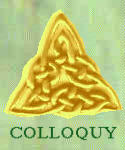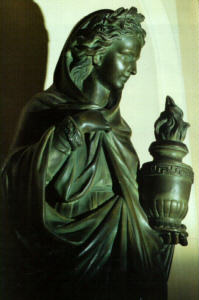

At the literate public level, Feynman was noted for his safe-cracking exploits at Los Alamos, his bongo playing at parties, his frigideira playing in a small Brazilian street band (the frigideira is a toy frying pan), or his talented drawings in later life. He meant to amuse, to be amused, and he succeeded well and truly. This part of his life, to read about, was both entertaining and understandable. I have read his lectures on quantum electrodynamics, and must concede that to the 'person without a grounding in advanced physics, there are more lacunae than illuminations.
Feynman worked diligently throughout his life at balancing his awesome academic power with folksy and mundane skills. In maturity he engaged in activities wildly at variance with the usual public perception of the proper role of the major scientist. Far from being quirky or eccentric, I truly believe that Feynman knew exactly what he was about ... doing whatever he did for a desired effect. He apparently derived as much satisfaction from these endeavors as he did from his scientific achievements. World class scholars are rarely appealing as human beings, generally uninteresting apart from their achievements or discoveries. Feynman was a coruscating exception to this generality. There is a video film, Last Journey of a Genius, a biographical sketch of Feynman. In it he proves to be a warm, clever, engaging and very likable person. The viewer experiences a real sense of pain and loss that Feynman was not able to make the journey to Tannu Tuva upon which he had set his heart for decades.
Feynman's life was marked by soaring peaks of success and abyssal troughs of tragedy. He was born and grew up in Far Rockaway, Long Island, in the 1930's, of middle class Jewish background and environment. He married his high school sweetheart, Arlene, who died about five years later of tuberculosis. Feynman was then working on atomic energy at Los Alamos. Arlene was a woman of uncommon beauty and intelligence and Richard adored her; there was a second marriage which ended in divorce, about which little is said in the biographical data. There was a third marriage to an English woman, Gweneth, apparently a happy and successful relationship which produced two children, Carl and Michelle.
Feynman never held any illusions about what he could do intellectually in his field of theoretical physics. He graduated from the Massachusetts Institute of Technology in 1939, then went on to Princeton to obtain his doctorate. While there he began working on the Manhattan Project, and he went to Los Alamos in April of 1943. While still at Princeton, he became deeply involved in the study of quantum electrodynamics.
His advisor, John Wheeler, thought it would be useful for Feynman to give a seminar on the subject. Feynman was astonished and appalled to find in the small group assembled for his lecture: Henry Russell, astronomer; John von Neumann, mathematician; Professor Pauli, physicist; and Albert Einstein. Each of these luminaries was world-famous at that time. Feynman was then in his early twenties. The lecture went smoothly. It was for his work on quantum electrodynamics that Feynman received the Nobel Prize in 1965, sharing it with Julian Schwinger and Sinitiro Tomonaga of Japan.
Adolescence is a period of the forming of the sense of personal identity. In Surely You're Joking, Mr Feynman, on page 67, there is a paragraph which sets forth Feynman's most basic ideas about his sense of masculinity and the appropriate ideas to be held. In his own words:
"... The reason why I say I'm "uncultured" or "anti-intellectual" probably goes all the way back to the time when I was in high school. I was always worried about being a sissy; I didn't want to be too delicate. To me, no real man ever paid any attention to poetry and such things. How poetry ever got written - that never struck me! So I developed a negative attitude toward the guy who studies French literature, or studies too much music or poetry - all those "fancy" things. I admired better the steel-worker, the welder, or the machine shop man. I always thought the guy who worked in the machine shop and could make things, now he was a real guy! That was my attitude. To be a practical man was, to me, always somehow a positive virtue, and to be "cultured" or "intellectual" was not. The first was right, of course, but the second was crazy ..."
Here we look into his very soul. This is the taproot, the innermost psyche. It was the tension between being an extreme intellectual and wanting to be regarded as a "regular fellow" that resulted in pranks, diversions and excursions indulged in by Feynman throughout his career. His anxiety over wanting to be seen as a "regular fellow" added dimensions to his personality that would not otherwise have occurred. We are indebted to him for much more than his magnificent achievements in science.
This article was originally published in the Baltimore Freethinker Journal.
